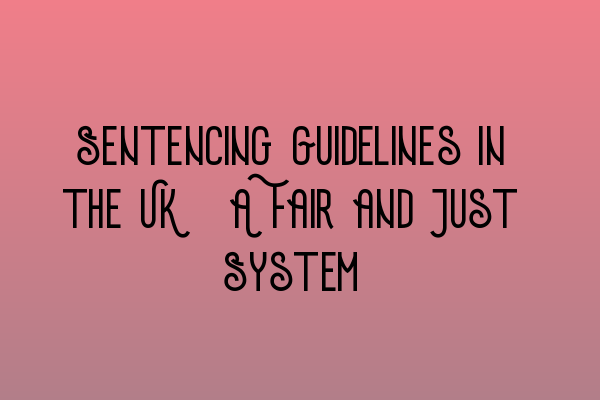Sentencing Guidelines in the UK: A Fair and Just System
When it comes to maintaining law and order, a crucial aspect of the criminal justice system is the sentencing of offenders. Sentencing guidelines play a vital role in ensuring that the punishment imposed on individuals who have committed crimes is fair and just. In the United Kingdom, these guidelines have been developed to provide consistent and transparent sentencing practices.
Before diving into the details of the UK’s sentencing guidelines, it is important to note that aspiring solicitors must be well-versed in this area as part of their preparation for the SQE exam. SQE Exam Prep: Essential Study Materials for Aspiring Solicitors provides a comprehensive overview of the topics necessary for success in this examination.
The Purpose of Sentencing Guidelines
The primary objective of sentencing guidelines is to promote consistency and fairness in the criminal justice system. By providing a framework for judges and magistrates, these guidelines ensure that similar offenses are treated similarly, regardless of the jurisdiction or personal bias. This consistency helps to build trust in the legal system and ensures justice is served.
Furthermore, sentencing guidelines offer transparency in the decision-making process. They help individuals understand why a particular punishment was imposed for a specific crime, fostering public confidence in the system.
Development of Sentencing Guidelines
In the UK, the Sentencing Council is responsible for the development of sentencing guidelines. This independent body brings together legal professionals, judiciary, and experts to create and revise the guidelines. Their aim is to provide clear and comprehensive guidance to judges and magistrates across England and Wales.
The process of developing guidelines involves extensive research and analysis. The council considers various factors, such as the seriousness of the offense, harm caused to the victim, and any mitigating or aggravating factors to ascertain the appropriate level of punishment.
Demystifying the Solicitors Qualifying Examination Format offers further insight into the SQE exam, which tests aspiring solicitors on their knowledge of the UK legal system and related areas.
Key Principles of Sentencing Guidelines
The sentencing guidelines in the UK are based on a set of key principles. These principles ensure that sentencing decisions are fair, proportionate, and take into account the individual circumstances of the case. The following are some of the fundamental principles guiding the UK’s sentencing guidelines:
- Proportionality: The punishment should be proportionate to the seriousness of the offense committed. More severe crimes warrant more severe penalties.
- Equality: Similar offenses should attract similar punishments, regardless of personal characteristics or background information.
- Deterrence: Sentences should act as a deterrent to the individual and the wider society, discouraging future criminal behavior.
- Rehabilitation: Where appropriate, sentences should aim to reform and rehabilitate the offender, reducing the likelihood of reoffending.
- Public Protection: The safety of the public is a paramount consideration. Sentencing decisions should protect society from potentially dangerous individuals.
Challenges and Success Strategies for International Lawyers
For international lawyers seeking to practice law in the UK, the SQE exam presents its own set of challenges. SQE Exam for International Lawyers: Challenges and Success Strategies offers valuable insights and strategies to overcome these challenges and achieve success in the examination.
Adherence to Sentencing Guidelines
Judicial adherence to the sentencing guidelines is crucial in maintaining a fair and just system. While judges have discretion in sentencing, they are expected to follow the guidelines unless there are exceptional circumstances justifying departure.
It is important to note that the guidelines provide a framework rather than rigid rules. They allow judges to consider the unique factors of each case and exercise their judgment to ensure fairness. However, departures from the guidelines must be clearly justified and transparent.
Conclusion
The UK’s sentencing guidelines are designed to create a fair and just system that promotes consistency, transparency, and proportionality in sentencing. Aspiring solicitors preparing for the SQE exam must have a comprehensive understanding of these guidelines and their underlying principles.
For comprehensive exam preparation materials, SQE Exam Prep: Essential Study Materials for Aspiring Solicitors is a valuable resource to ensure success in the examination and future legal practice.
Understanding the sentencing guidelines and their importance is essential for anyone interested in criminal law. By adhering to these guidelines, the legal system in the UK strives to achieve justice for all.
